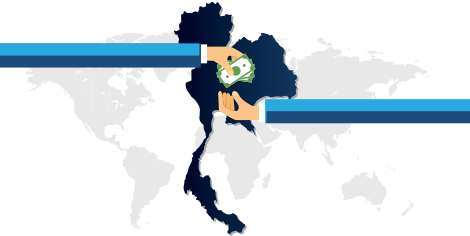Move Your Money: The Ins and Outs of Transferring Funds in Thailand
Submitted by Creveling & Creveling Private Wealth Advisory on April 17th, 2016By Peggy Creveling, CFA and Chad Creveling, CFA
One of the first financial questions foreigners planning to move to Thailand often have is how to transfer money in and out of the country. To help expats who are new to Thailand decide on which method suits their situation, we’ve described a few of the options below:

- Bank Wire Transfers—Best Way to Move Large Sums: If you plan to transfer a sizable amount of money between two bank accounts and you need a record of the transfer, you may wish to move funds using a bank wire transfer.
Inbound transfers: To transfer money into Thailand, you’ll need to provide the sending bank with the exact name on the recipient’s account, account number, the amount of the transfer, and the Thai bank SWIFT code. You may also need to give other details, such as the Thai bank’s address and phone number, and the recipient’s address and phone number. Depending on the amount and the banks involved, the transfer could cost anywhere from a minimum of THB 200 to THB 2,400 for very large transfers, and it may take several days. If the amount involved is greater than USD 50,000, the Thai bank will require the recipient to complete a Foreign Exchange Transaction Form when the funds arrive.
Outbound Transfers: To transfer money out of Thailand, you’ll need to provide the Thai bank with the exact name on the recipient’s account, account number, the amount of the transfer, and the receiving bank’s SWIFT code (or IBAN code if the bank is in Europe). In addition, expats may need to provide supporting documentation stating the source of the funds. If you have online access to your Thai bank account, you may be able to arrange an international fund transfer if you sign up for this capability in advance, but there will be a limit as to how much you can transfer in a single day.
Tip: Consider having the Thai bank convert currency. Do a comparison of exchange rates on offer beforehand. Thai banks’ foreign exchange rates for exchanging baht can be quite competitive, and you may find that having a Thai bank do the Forex transaction will get you the best rate.
- Agent Wire Transfers—Fast, but Costly: To transfer cash to a specific person in or out of Thailand more quickly but at significantly greater expense, you can use companies such as Western Union or MoneyGram. You’ll need to go to one of the agent’s locations, provide the name and country of the recipient, and pay for the transfer in cash. The agent will give you a registration or control number that needs to be forwarded to the recipient. The transfer happens immediately, and the recipient can collect cash at the agent’s office in the receiving country using a valid ID and the control number.
The advantages over a bank wire transfer are that no banks are needed and the cash is transferred within minutes. The downside is the cost. For example, a USD 2,000 cash transfer from the United States to Thailand might cost nearly USD 200 (USD 114 in transfer fees and USD 85 in foreign exchange fees).
- PayPal―Inexpensive, but Slow: For inbound fund transfers and for relatively little cost, you could conceivably transfer funds from your foreign bank account to your linked foreign PayPal account and then convert to Thai baht at a competitive rate. The funds could then be transferred to a Thai PayPal account that is linked to a Thai bank account. Once the funds are received in the Thai PayPal account, they can be transferred to the linked Thai bank account.
The advantage to using PayPal to transfer funds to Thailand is that if the funds were originally uploaded from a foreign bank account (instead of a credit or debit card), the transaction and foreign exchange fees on a transaction like this will be relatively low. The drawback is the amount of time to do the transfer. While the PayPal-to-PayPal transfer happens almost instantly, uploading funds to PayPal from a bank account may take 7–10 days, and the same amount of time may be needed to download the funds to the bank account on the other side.
- ATMs―Best Way to Access Smaller Amounts: One of the easiest and quickest ways to access cash internationally may still involve using your ATM or debit card in ATMs that are part of international networks such as PLUS (Visa) or Cirrus (MasterCard). The exchange rate you’ll receive will be quite competitive as it will be based on the wholesale bank rate. However, you’ll still have to pay ATM fees (in Thailand this fee is THB 200 per transaction on a foreign card), so you’ll want to avoid withdrawing very small amounts.
A cautionary note on using credit cards in ATMs: By using a credit card, you’re taking on debt rather than withdrawing cash. Worse, most credit cards will start charging you a percentage for the “cash advance” from the moment the advance is made, so there’s no grace period, unlike with normal credit card purchases. For this reason, credit card withdrawals from ATMs should be used only in the case of emergencies.
This article is a revised and updated version of one that appeared previously on www.crevelingandcreveling.com .
About Creveling & Creveling Private Wealth Advisory
Creveling & Creveling is a private wealth advisory firm specializing in helping expatriates living in Thailand and throughout Southeast Asia build and preserve their wealth. The firm is a Registered Investment Adviser with the U.S. SEC and is licensed and regulated by the Thai SEC. Through a unique, integrated consulting approach, Creveling & Creveling is dedicated to helping clients cut through the financial intricacies of expat life, make better decisions with their money, and take the steps necessary to provide a more secure future.
Copyright © 2020 Creveling & Creveling Private Wealth Advisory, All rights reserved. The articles and writings are not recommendations or solicitations, and guest articles express the opinion of the author; which may or may not reflect the views of Creveling & Creveling.

